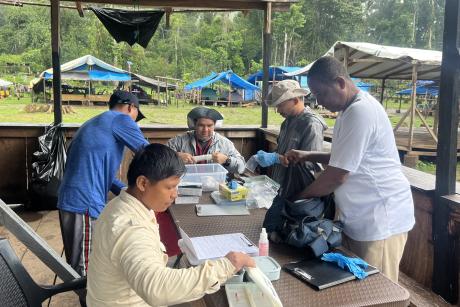Liz Turner, Ph.D., remembers arriving at the Duke Global Health Institute in 2012 to help launch a new biostatistics core. At the time, the unit had only one other employee – biostatistician Alyssa Platt – and Turner, fresh from the London School of Hygiene and Tropical Medicine, knew little about how grants, funding and academia worked in the United States.
From a shared office on the second floor of Trent Hall, Turner and Platt began building what is now DGHI’s Research Design & Analysis Core (RDAC), a multitalented team of 10 data experts who support global health scholars in designing, carrying out and analyzing data-driven research. In its first 10 years, RDAC has been a part of more than 150 grant submissions, resulting in over $50 million in externally funded research. During that time, the team has also advised more than 290 global health students on research methodology and design.
“It has been stimulating and motivating not just being a part of RDAC, but being able to help build it,” says Turner, an associate professor of biostatistics, bioinformatics and global health who has been RDAC’s director since its launch. “Our ability to meet the needs of projects has really grown.”
In 2020-21, RDAC worked with 45 DGHI faculty on 127 research projects, while also aiding students in DGHI’s Master of Science in Global Health program with their thesis projects. The team has grown to include expertise on epidemiology, survey design, geographic information systems (GIS) and even artificial intelligence (AI).
Such broad knowledge makes RDAC a “major asset” to DGHI, says Wendy Prudhomme O’Meara, DGHI’s associate director for research and an associate professor of medicine and global health. O’Meara was also among RDAC’s first collaborators. She consulted RDAC on work involving a cluster-randomized trial targeting anti-malarial drugs in western Kenya.
“Having a team like RDAC brings rigor to the research enterprise that is so important for global health and for our research to have the credibility to become a tool for decision-making, policy and change,” O’Meara says.
Turner says she’s grateful DGHI values RDAC, and that only promises to make RDAC’s next decade even busier than its first.
“DGHI consistently invests in us to always ask questions and challenging research in a good way,” says Turner. “With more people on our team, we’re better at recognizing what our collaborators need. I’m really proud of our team.”
So What Exactly Do They Do?
To mark their 10th birthday, we asked the RDAC team to share 10 tips for working with statisticians and other data experts. Check out their list below – and don’t worry, there’s no math involved.
Around DGHI
10 Things to Know About Working With a Statistician
Involving an expert in statistical methods in research can improve study design and results.
Read More



